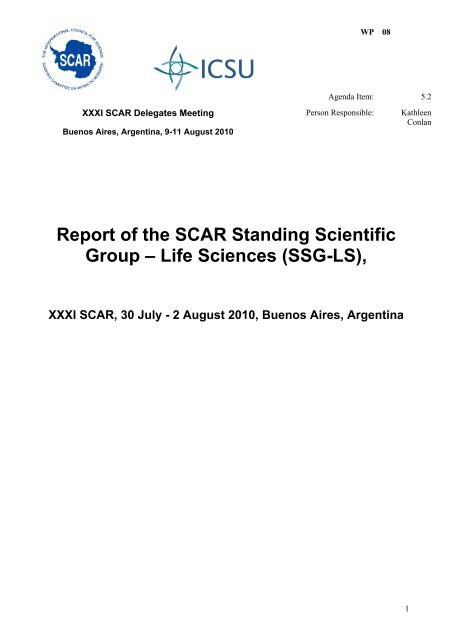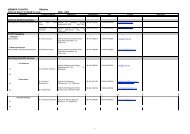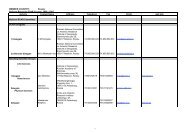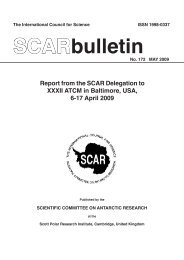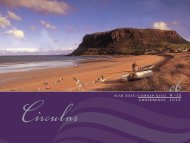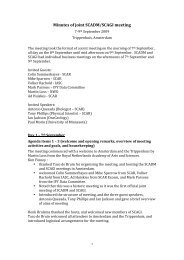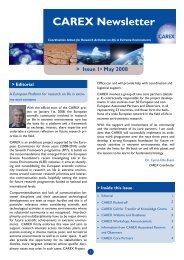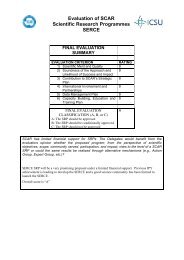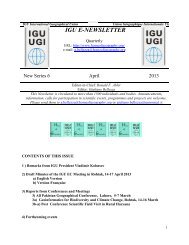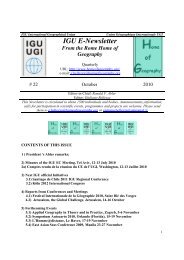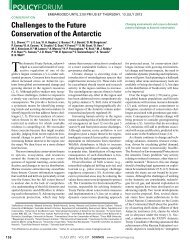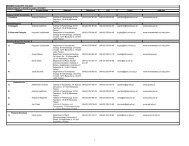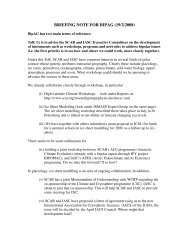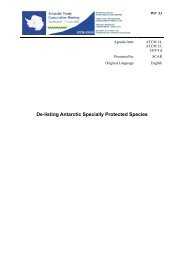Report of XXXI SCAR SSG Life Sciences Meeting, Buenos Aires, 30 ...
Report of XXXI SCAR SSG Life Sciences Meeting, Buenos Aires, 30 ...
Report of XXXI SCAR SSG Life Sciences Meeting, Buenos Aires, 30 ...
You also want an ePaper? Increase the reach of your titles
YUMPU automatically turns print PDFs into web optimized ePapers that Google loves.
WP 08<br />
Agenda Item: 5.2<br />
<strong>XXXI</strong> <strong>SCAR</strong> Delegates <strong>Meeting</strong> Person Responsible: Kathleen<br />
Conlan<br />
<strong>Buenos</strong> <strong>Aires</strong>, Argentina, 9-11 August 2010<br />
<strong>Report</strong> <strong>of</strong> the <strong>SCAR</strong> Standing Scientific<br />
Group – <strong>Life</strong> <strong>Sciences</strong> (<strong>SSG</strong>-LS),<br />
<strong>XXXI</strong> <strong>SCAR</strong>, <strong>30</strong> July - 2 August 2010, <strong>Buenos</strong> <strong>Aires</strong>, Argentina<br />
1
WP 08<br />
Executive Summary<br />
Title: <strong>Report</strong> <strong>of</strong> the <strong>SCAR</strong> Standing Scientific Group – <strong>Life</strong> <strong>Sciences</strong> (<strong>SSG</strong>-LS), <strong>XXXI</strong> <strong>SCAR</strong>, <strong>30</strong> July - 2<br />
August 2010, <strong>Buenos</strong> <strong>Aires</strong>, Argentina<br />
Author: Kathleen Conlan, Chief Officer<br />
Relevant URLs or references to other reports: http://www.scar.org/researchgroups/lifescience/.<br />
Important Issues or Factors:<br />
1. With the planned end <strong>of</strong> the <strong>SCAR</strong> Scientific Research Programme “Evolution and Biodiversity in the Antarctic”<br />
(EBA) in 2013, the <strong>SSG</strong>-LS has separately endorsed each <strong>of</strong> the following new proposed Programme Planning<br />
Groups (PPGs) for Delegate approval:<br />
- State <strong>of</strong> the Antarctic Ecosystem (AntEco)<br />
- Antarctic Ecosystems: Adaptations, Thresholds and Resilience (AntETR)<br />
2. The <strong>SSG</strong>-LS ran the highly successful <strong>SCAR</strong> X Biology Symposium with 113 oral and 122 poster presentations<br />
given under the six sub-themes <strong>of</strong> EBA. A special issue <strong>of</strong> “Polar Science” will be published shortly. New<br />
initiatives were a special session for APECS (Association <strong>of</strong> Polar Early Career Scientists), awards for the early<br />
career scientist presentations and an outreach session.<br />
3. South Africa and Spain <strong>of</strong>fered to host the <strong>SCAR</strong> XI Biology Symposium in 2013. By closed ballot, Spain was<br />
selected. This Symposium will showcase the accomplishments <strong>of</strong> EBA and set the stage for the two new SRPs (if<br />
approved).<br />
4. Members <strong>of</strong> the <strong>SSG</strong>-LS were co-authors <strong>of</strong> the ACCE <strong>Report</strong>, showing that Antarctic life is clearly showing<br />
climate change effects and predicting the scenario for the next 100 years.<br />
5. The EG-CPR has produced the Southern Ocean Zooplankton Atlas which will enable monitoring and prediction <strong>of</strong><br />
zooplankton changes. The EG-CPR will be a core program <strong>of</strong> SOOS and provide a link to CCAMLR.<br />
6. The EG-Birds and Marine Mammals is establishing links with CCAMLR and SOOS through its top predator<br />
tracking database.<br />
7. The EG-Human Biology and Medicine is small but scientifically active. It wishes a closer link <strong>of</strong> <strong>SCAR</strong> with<br />
COMNAP in respect to research into human biology and medicine.<br />
8. The IPY programme Census <strong>of</strong> Antarctic Marine <strong>Life</strong> will end this year (2010). It will synthesize its achievements<br />
in a special science publication and a video. It has been highly successful and has left a large legacy.<br />
9. The <strong>SSG</strong>-LS will sponsor a workshop on King George Island to establish the scope <strong>of</strong> current and future research<br />
and develop a strategic plan for handling future collaborative efforts there.<br />
10. The <strong>SSG</strong>-LS is forming two additional cross-linkages (in addition to its two current cross-linkages with the <strong>SSG</strong>-<br />
PS and GS): (1) ATHENA, an Expert Group to steward subglacial lake exploration and (2) a cross-Action group<br />
with the <strong>SSG</strong>-PS on Ocean Acidification. Further cross-linkages with both PS and GS will be established through<br />
its two proposed PPGs.<br />
11. Subsidiary group funding requests are in excess <strong>of</strong> expected allocation by 39% in 2011 and 51% in 2012, an<br />
indication that the <strong>SSG</strong>-LS may have difficulty completing its tasks.<br />
Recommendations/Actions, Justification and Outcomes:<br />
1. The <strong>SSG</strong>-LS asks that the Delegates recommend to National Committees that they urge their national funding<br />
agencies to consider contributing to the <strong>SCAR</strong> Marine Biodiversity Information Network (<strong>SCAR</strong>-MarBIN) funding<br />
for the period 2011-2015. This will enable <strong>SCAR</strong> to continue to efficiently contribute data and expertise, enable<br />
<strong>SCAR</strong>-MarBIN to be the main biodiversity data provider to SOOS, and enable <strong>SCAR</strong> to be actively associated with<br />
emerging initiatives.<br />
2. The <strong>SSG</strong>-LS asks that the Delegates advise that <strong>SCAR</strong> adopt the revised Code <strong>of</strong> Conduct for Use <strong>of</strong> Animals for<br />
Scientific Purposes in Antarctica and requests that National Committees support the paper when it is submitted to<br />
the ATCM by <strong>SCAR</strong> in 2011. Recognising that animals are sentient beings and need to be treated ethically when<br />
involved in scientific experiments, this revised Code <strong>of</strong> Conduct will conform to good practice.<br />
3. The <strong>SSG</strong>-LS asks that <strong>SCAR</strong> reconsider the scheduling <strong>of</strong> the biennial Open Science Conference in the face <strong>of</strong><br />
growing concerns over carbon release by participant travel and the known impacts <strong>of</strong> excess carbon on the<br />
Antarctic environment.<br />
4. The <strong>SSG</strong>-LS asks that <strong>SCAR</strong> consider ways in which to increase its allocations, given the large discrepancy<br />
between funds requested and allocated.<br />
3
WP 08<br />
<strong>SCAR</strong> STANDING SCIENTIFIC GROUP - LIFE SCIENCES (<strong>SSG</strong>-LS)<br />
Chief Officer: Kathleen Conlan (Canada)<br />
Deputy Chief Officer: open<br />
Secretary: Deneb Karentz (USA)<br />
<strong>XXXI</strong> <strong>SCAR</strong>, <strong>30</strong> July - 2 August 2010,<br />
<strong>Buenos</strong> <strong>Aires</strong>, Argentina<br />
Attendees: Appendix A<br />
Agenda and reports: Appendix B and http://www.scar.org/researchgroups/lifescience/.<br />
Minutes: will be posted at http://www.scar.org/researchgroups/lifescience/.<br />
1. Major future initiatives and actions<br />
1.1 Proposed new Scientific Research Programmes (agenda item 26, Docs 13 and 14) Dominic<br />
Hodgson and Julian Gutt<br />
With the planned end <strong>of</strong> the <strong>SCAR</strong> Scientific Research Programme “Evolution and Biodiversity in<br />
the Antarctic” (EBA) in 2013, the <strong>SSG</strong>-LS has separately endorsed each <strong>of</strong> the following new<br />
proposed Programme Planning Groups for Delegate approval:<br />
a. State <strong>of</strong> the Antarctic Ecosystem (AntEco) (Doc 13)<br />
b. Antarctic Ecosystems: Adaptations, Thresholds and Resilience (AntETR) (Doc 14)<br />
These were developed at the following planning meetings:<br />
• Where to Next? Ideas for the New <strong>SCAR</strong> Biology Programs, 29 July 2009 in conjunction<br />
with <strong>SCAR</strong> X Biology Symposium, Sapporo, Japan<br />
• Scientific Program Planning Workshop, 27-28 May 2010, Castiglioncello, Italy with 25<br />
participants from 12 nations.<br />
<strong>Meeting</strong> minutes are at http://www.scar.org/researchgroups/lifescience/.<br />
2. Major activities and significant progress<br />
2.1 Major <strong>Meeting</strong>s<br />
<strong>SCAR</strong> X Biology Symposium (agenda item 19, Doc 20) Mitsuo Fukuchi<br />
The <strong>SSG</strong>-LS sponsored the <strong>SCAR</strong> X Biology Symposium on 26-29 July 2009 in Sapporo, Japan.<br />
The theme was “Antarctic Biology in the 21 st Century—Advances in and beyond IPY—“. The<br />
response was excellent with 113 oral and 122 poster presentations given under the six sub-themes<br />
<strong>of</strong> EBA. A special issue <strong>of</strong> “Polar Science” will be published in 2010, containing six review and<br />
18 research papers. New initiatives were:<br />
• special session for APECS (Association <strong>of</strong> Polar Early Career Scientists)<br />
• awards for the early career scientist presentations<br />
• outreach session with the general public<br />
The huge success <strong>of</strong> the Symposium was thanks to the very capable organization <strong>of</strong> Mitsuo Fukuchi<br />
and his LOC, who were very influential with Japanese funding agencies. The result was that the<br />
conference had a surplus, which enabled monetary awards to early career scientists, publication <strong>of</strong><br />
results and coverage <strong>of</strong> expenses <strong>of</strong> keynote speakers.<br />
4
WP 08<br />
2.2 Major <strong>Report</strong>s<br />
• The EG-CPR has produced the Southern Ocean Zooplankton Atlas which demonstrates<br />
ranges, seasonality and persistent hotspots <strong>of</strong> zooplankton abundance. This will enable<br />
monitoring and prediction <strong>of</strong> zooplankton changes. It is in press as part <strong>of</strong> the Polar Science<br />
Special issue <strong>of</strong> papers presented at the <strong>SCAR</strong> X Biology Symposium.<br />
• Members <strong>of</strong> the <strong>SSG</strong>-LS were co-authors <strong>of</strong> the ACCE <strong>Report</strong>, showing that Antarctic life is<br />
clearly showing climate change effects and predicting the scenario for the next 100 years.<br />
2.3 Subsidiary Bodies outcomes<br />
2.3.1 Expert Groups<br />
EG-Human Biology and Medicine (agenda item 22, Doc 7) Marc Shepanek (USA)<br />
The EG-HB&M is still having difficulty coordinating National <strong>SCAR</strong> Committee representation.<br />
However, Russia, South Korea and Switzerland have now proposed new members. The EG-<br />
HB&M reminded the <strong>SSG</strong>-LS <strong>of</strong> the potential for Lyme Disease to enter the Antarctic via seabirds<br />
and cautions awareness <strong>of</strong> ticks as the vectors. Particular research interest in the US and Australian<br />
programs has focussed on bone mineral density and vitamin D levels in the Antarctic Population.<br />
The EG has maintained contact with colleagues in COMNAP’s former MEDINET and continues to<br />
work on projects, particularly a disease reporting system. The EG is still investigating joint <strong>SCAR</strong>-<br />
COMNAP working in this field.<br />
EG-Birds and Marine Mammals (agenda item 23, Doc 6) Mark Hindell (Australia)<br />
The EG-BAMM has identified 165 scientists working on top predators in the Southern Ocean from<br />
19 countries. They have developed a website for posting news, information and guidelines,<br />
including all the functionalities to search, browse and display the tracking data <strong>of</strong> top predators that<br />
are contained in <strong>SCAR</strong>-MarBIN (: http://egbamm.olympe-network.com/<strong>SCAR</strong>2/). The EG is also<br />
developing a meta-database <strong>of</strong> all tracking data on top predators work in the Southern Ocean. The<br />
next, and more challenging, step is to compile raw tracking data <strong>of</strong> top predators in the <strong>SCAR</strong>marBIN<br />
database. Finally, the EG is working with the Census <strong>of</strong> Antarctic Marine <strong>Life</strong> to conduct<br />
a biogeographic synthesis for top predators for conservation and management in the Southern<br />
Ocean.<br />
EG-Continuous Plankton Recorder (agenda item 24, Doc 22 Mitsuo Fukuchi (Japan)<br />
The EG-CPR’s new Southern Ocean Zooplankton Atlas will be a significant contribution to<br />
defining zooplankton biogeography and identify persistent hotspots which coincide with predator<br />
distribution patterns. This Atlas will provide essential data to EG-BAMM, CAML, SOOS and<br />
CCAMLR. The draft SOOS Implementation plan has recommended that the SO-CPR Survey be<br />
maintained and expanded and in particular fill gaps in the Pacific and Atlantic sectors and in winter.<br />
A member <strong>of</strong> CCAMLR continues to serve on the EG-CPR. Biogeographic analysis <strong>of</strong> the CPR<br />
data is continuing as the main zooplankton contribution to the CAML Biogeographic Synthesis<br />
Atlas for the Southern Ocean.<br />
The EG-CPR is still analysing the apparent shift from krill to mesozooplankton dominance<br />
observed in the sea-ice zone <strong>of</strong> eastern Antarctica. The large blooms <strong>of</strong> pelagic foraminiferans<br />
observed in 2005 may be a result <strong>of</strong> elevated chlorophyll a. Although numbers have reduced, there<br />
are still localised large blooms south <strong>of</strong> Tasmania and New Zealand.<br />
The dataset currently holds ~25,800 records at 5 nmile resolution for about 2<strong>30</strong> species and krill<br />
developmental stages plus environmental data up to the end <strong>of</strong> the 2007/08 season (March 2008).<br />
This represents approximately 70% <strong>of</strong> the Southern Ocean. The 2009/10 data will extend the data<br />
5
ase to ~<strong>30</strong>,000 records. Data are held at the AADC and accessible through <strong>SCAR</strong>-MarBIN<br />
(http://www.scarmarbin.be/). It continues to be one <strong>of</strong> the largest data sets in MarBIN and<br />
consistently receives high download requests.<br />
WP 08<br />
There were 51 tows in 2008/09 and 45 tows in 2009/10. Vessels from Australia, New Zealand,<br />
Japan and Brazil are involved with Chile coming on stream. The Drake Passage and Ross Sea<br />
annual surveys will provide valuable new data in two important fishing regions. Training courses<br />
are being regularly run in order to expand the program to other countries and standardize methods.<br />
CPR surveys are expanding globally and the aim is to develop a global CPR database.<br />
2.3.2 Other initiatives<br />
Census <strong>of</strong> Antarctic Marine <strong>Life</strong> (CAML) agenda item 25b Vicky Wadley (Australia)<br />
The International Polar Year programme CAML was the biggest-ever survey <strong>of</strong> Antarctic marine<br />
life with 18 voyages over the span <strong>of</strong> the IPY. Products were:<br />
• 400,000 bacterial tag sequences<br />
• Inventory <strong>of</strong> 9,346 species <strong>of</strong> which hundreds are new to science<br />
• DNA barcoded 15,000 sequences<br />
• Access to 1.1 million distribution records<br />
• Hundreds <strong>of</strong> scientific publications and media articles<br />
• Online encyclopaedia and illustrated keys<br />
As a result, numerous discoveries were made about the Southern Ocean:<br />
• High species richness, with some species being apparently bipolar<br />
• No evidence to date <strong>of</strong> introduced species<br />
• Single benthic bioregion under the Antarctic Circumpolar Current (ACC)<br />
• Communities under iceshelves change drastically when the iceshelf collapses<br />
• Octopus colonisation pathway is northwards from the Southern Ocean via the deep sea<br />
The Census <strong>of</strong> Antarctic Marine <strong>Life</strong> has left a large legacy. It has:<br />
• Produced a robust data baseline for future change<br />
• Developed a virtual legacy with the data portal <strong>SCAR</strong>-MarBIN<br />
• Developed a bio-regionalisation for conservation<br />
• Identified sentinel species for the Southern Ocean Observing System<br />
• Produced species lists, publications and field guides<br />
• Developed a network in <strong>30</strong> countries, 7 in South America<br />
• Trained scientists in the International Polar Year<br />
A synthesis <strong>of</strong> CAML results will be published in a special volume <strong>of</strong> Deep-Sea Research. CAML<br />
has also produced a video about its achievements which will be shown in early October at the finale<br />
<strong>of</strong> the Census <strong>of</strong> Marine <strong>Life</strong> in London.<br />
<strong>SCAR</strong> Marine Biodiversity Information Network (<strong>SCAR</strong>-MarBIN) agenda item 25c Bruno<br />
Danis (Belgium)<br />
The <strong>SCAR</strong>-MarBIN philosophy is to build a network with free and open access to support Antarctic<br />
science. Since 2005 the web portal has had 800,000 visitors and 5,800,00 hits and 39 million<br />
records have been downloaded. The first Registry <strong>of</strong> Antarctic Marine Species (RAMS) has 16,000<br />
taxa. Geographic data are interfaced with OBIS, GBIF, etc. Projects can make custom field guides,<br />
georeference genetic data, and access the biogeographic atlas <strong>of</strong> the Southern Ocean, etc. The<br />
Antarctic Biodiversity Information Facility (ANTABIF), which provides terrestrial data as well as<br />
marine, has been functional since mid-June 2010 (www.biodiversity.aq). Associations have been<br />
established with other biodiversity databases; e.g., Global Biodiversity Information Facility (GBIF),<br />
Polar Information Commons (PIC), Intergovernmental Science – Policy Platform on Biodiversity<br />
and Ecosystem Processes (IPBES).<br />
6
WP 08<br />
Action: Given the value <strong>of</strong> and range <strong>of</strong> <strong>SCAR</strong>-MarBIN activities and the need for a reliable and<br />
sufficient funding, the <strong>SSG</strong>-LS recommends to the Delegates:<br />
Recommendation <strong>SCAR</strong> <strong>XXXI</strong> – <strong>SSG</strong>-LS-2 – External<br />
Concerning the future <strong>of</strong> the <strong>SCAR</strong> Marine Biodiversity Information Network (<strong>SCAR</strong>-MarBIN) as a<br />
major component <strong>of</strong> the Antarctic Biodiversity Information Facility (ANTABIF)<br />
Recognizing the achievements, the crucial usefulness and potentials <strong>of</strong> the <strong>SCAR</strong>-MarBIN network<br />
in terms <strong>of</strong> compilation, integration, accessibility and dissemination <strong>of</strong> Antarctic marine<br />
biodiversity data for research, management, conservation and monitoring purposes,<br />
Stressing the need for <strong>SCAR</strong> to continue to efficiently contribute data and expertise to GBIF<br />
(Global Biodiversity Information Facility) as an Associate Participant,<br />
Considering the critical role <strong>of</strong> <strong>SCAR</strong>-MarBIN as the main biodiversity data provider to SOOS<br />
(Southern Ocean Observation System),<br />
Stressing the interest for <strong>SCAR</strong> to be actively associated with emerging initiatives such as the<br />
world-scale IPBES (Intergovernmental Science-Policy Platform on Biodiversity and Ecosystem<br />
Services), or the PIC (Polar Information Commons),<br />
<strong>SCAR</strong> recommends to National Committees that they urge their national funding agencies to<br />
consider contributing to <strong>SCAR</strong>-MarBIN funding for the period 2011-2015.<br />
2.3.3. Other matters<br />
Working paper: <strong>SCAR</strong> Code <strong>of</strong> Conduct for Use <strong>of</strong> Animals for Scientific Purposes in<br />
Antarctica (agenda item17, Doc 2) David Walton (UK)<br />
The first code <strong>of</strong> conduct on animal research was provided by <strong>SCAR</strong> in 1990 and adopted by the<br />
Treaty in 1994. Now, 20 years later, the code needs to be updated for the 21 st century. The code <strong>of</strong><br />
conduct is not a legal document, it only provides guidelines. There was discussion about wording <strong>of</strong><br />
the document (e.g., Does it support or only complement national laws and policies? What is meant<br />
by “experimentation”?, etc.). The document was edited and the revised version adopted.<br />
Action: The <strong>SSG</strong>-LS submits a recommendation to the Delegates for acceptance <strong>of</strong> the Code <strong>of</strong><br />
Conduct.<br />
Recommendation <strong>SCAR</strong> <strong>XXXI</strong> – <strong>SSG</strong>-LS-1 – External<br />
Concerning the importance <strong>of</strong> ethical treatment <strong>of</strong> animals in scientific experiments<br />
Recognising that animals are sentient beings and need to be treated ethically when involved in<br />
scientific experiments<br />
Noting that the <strong>SCAR</strong> Code <strong>of</strong> Conduct for the Use <strong>of</strong> Animals for Scientific Purposes in Antarctica<br />
that was adopted in 1990 at XXI <strong>SCAR</strong> and in 1994 by the ATCM is now in need <strong>of</strong> revision to<br />
conform to good practice<br />
Recommend that <strong>SCAR</strong> adopt the revised Code and request National Committees support the paper<br />
when submitted to the ATCM by <strong>SCAR</strong> in 2011.<br />
Informal report <strong>of</strong> the CCAMLR Observer (agenda item 16, Doc 17) Mark Hindell (Australia)<br />
There are a number <strong>of</strong> <strong>SCAR</strong> activities <strong>of</strong> relevance to CCAMLR: The Census <strong>of</strong> Antarctic Marine<br />
<strong>Life</strong> (CAML), the <strong>SCAR</strong> Marine Biodiversity Information Network (<strong>SCAR</strong>-MarBIN), the Expert<br />
Group on Birds and Marine Mammals (EG-BAMM), the <strong>SCAR</strong>/SCOR developing Southern Ocean<br />
Observing System (SOOS), and the Antarctic Climate Change and the Environment (ACCE) report.<br />
The <strong>SCAR</strong> Observer to CCAMLR, Mark Hindell, reported on these developments.<br />
CCAMLR welcomed the report and in particular the desire for <strong>SCAR</strong> to forge closer links, noting<br />
the potential for productive linkages between the <strong>SCAR</strong> EG-BAMM and its Working Group on<br />
Ecosystem Monitoring and Management (WG-EMM), especially noting the plans for <strong>SCAR</strong> to<br />
develop a tracking database <strong>of</strong> birds and mammals in the Convention Area. The committee<br />
7
WP 08<br />
specifically noted the value <strong>of</strong> this work to WG-EMM and its work on developing Marine Protect<br />
Areas (MPAs). CCAMLR recognised the value <strong>of</strong> obtaining input from the CEP and <strong>SCAR</strong> to<br />
discussions on MPAs, to ensure harmonisation across the Antarctic Treaty System, and to facilitate<br />
the provision and use <strong>of</strong> the best available scientific data. It agreed that experts/observers from the<br />
CEP and <strong>SCAR</strong> should be invited to attend meetings <strong>of</strong> CCAMLR’s WG-EMM and to participate<br />
in inter-sessional work on the topic <strong>of</strong> MPAs, as appropriate.<br />
Selection <strong>of</strong> the site for the XI <strong>SCAR</strong> Biology Symposium agenda item 29, Doc 21 (part) Don<br />
Cowan (South Africa) and Leopoldo García Sancho (Spain)<br />
South Africa and Spain presented proposals for holding the 11 th <strong>SCAR</strong> Biology Symposium in<br />
2013. Voting was by closed ballot and Spain was selected.<br />
3. Strategic consideration <strong>of</strong> issues, concerns, problems<br />
3.1 Comments on Joint <strong>SSG</strong> meetings and on the Draft <strong>SCAR</strong> Strategic Plan 2011-2016<br />
The <strong>SSG</strong>-LS viewed the joint session <strong>of</strong> <strong>SSG</strong>s as a positive change in format and agreed that it<br />
should be continued.<br />
3.1.1 <strong>SCAR</strong> and Climate Change (agenda item 4) John Turner<br />
The <strong>SSG</strong>-LS was asked to comment on the request to provide annual reports on climate and biology<br />
to the ATS. So far it has been difficult to obtain responses. Suggestions to improve reporting<br />
included using action and expert groups to provide highlights, increasing size <strong>of</strong> groups, extending<br />
the list <strong>of</strong> people to approach, hiring a postdoc to review journals and write a summary article, and<br />
requesting that <strong>SCAR</strong> should be compensated for service to the Treaty.<br />
3.1.2 Cross-<strong>SSG</strong> Action Group on King George Island (agenda item 9) Sergio Marenssi<br />
The <strong>SSG</strong>-LS noted that the report from the King George Island Cross-<strong>SSG</strong> Action Group that was<br />
presented at the joint <strong>SSG</strong> meeting was very negative and further clarification <strong>of</strong> the report was<br />
needed. Following a meeting with Sergio Marenssi, the <strong>SSG</strong>-LS noted the substantial scientific<br />
and operational activities at King George Island, the need to gather information to develop<br />
cooperative initiatives and avoid logistical and scientific duplication and overlap (e.g., temporal,<br />
spatial, thematic), and optimize efforts and costs by sharing logistics and scientific infrastructure<br />
wherever possible.<br />
Action: the <strong>SSG</strong>-LS recommends that a <strong>SCAR</strong>-sponsored workshop be held to establish the scope<br />
<strong>of</strong> the current and future research, and develop a strategic plan for handling future collaborative<br />
efforts at King George Island. This <strong>SCAR</strong>-sponsored workshop would gather scientific and<br />
operational representatives from each country currently involved in research at King George Island.<br />
3.1.3 Cross-<strong>SSG</strong> Action Group on Prediction <strong>of</strong> Changes in the Physical and Biological<br />
Environments <strong>of</strong> the Antarctic (agenda item 11, Doc 5) Julian Gutt<br />
The <strong>SSG</strong>-LS is very active in this group with contributors to the ACCE report having added a<br />
substantial biological component.<br />
3.1.4 <strong>SCAR</strong> Strategic Plan 2011-2016 (v 5.1) (agenda item 15, Doc 11) Chuck Kennicutt (<strong>SCAR</strong><br />
President)<br />
<strong>SSG</strong>-LS members in general support the 5.1 version <strong>of</strong> the strategic plan. There was some<br />
consensus that <strong>SCAR</strong> science should include the term “extreme”, as well as “cold” to be fully<br />
inclusive <strong>of</strong> all Antarctic organisms. It was also felt that the Strategic Plan should clearly<br />
emphasize that <strong>SCAR</strong> is an organization <strong>of</strong> volunteers that does not fund science. There was also<br />
8
WP 08<br />
the suggestion that <strong>SCAR</strong> is a small coordinating organization run by volunteers, but perhaps<br />
presenting itself as a large organization.<br />
3.1.5. <strong>SCAR</strong> Open Science Conference<br />
The <strong>SSG</strong>-LS was unable to discuss this topic thoroughly due to time constraints. It was evident,<br />
though, that this was a topic that invoked lively interest and should be afforded more opportunity<br />
for debate. Comments given before this topic had to be closed by time constraints were as follows.<br />
There was concern about the large amount <strong>of</strong> CO 2 being generated to attend this conference and that<br />
<strong>SCAR</strong> should be exemplary in reducing this load, especially given the impact <strong>of</strong> elevated CO 2 on<br />
the Southern Ocean and terrestrial ecosystems. A suggestion is to reduce the OSC to every 4 years,<br />
with the intervening 2 years being filled by SRP science conferences such as the <strong>SCAR</strong> Biology<br />
Symposium. Recognizing that <strong>SCAR</strong> Business and Delegates meetings need to be held every 2<br />
years, the <strong>SSG</strong>-LS suggested that in the non-OSC years, science presentations could be made to the<br />
Delegates as Keynote addresses.<br />
Comments on aspects <strong>of</strong> the OSC operation were also made:<br />
• Keynotes and regular talks must be standardized to allow going from room to room, to<br />
attend different papers during the same session.<br />
• Need sufficient notice for meetings, registration, abstract submission - some participants<br />
cannot attend because <strong>of</strong> short notice and insufficient time to apply for travel funds and plan<br />
other activities.<br />
• Theme <strong>of</strong> 2012 OSC should accommodate EBA since it will be the wind up for this program<br />
and special sessions will be needed. <strong>SSG</strong>-LS needs to suggest sessions for meeting that<br />
reflect all programs. Next OSC should pay more attention to SRPs and other <strong>SCAR</strong><br />
programs.<br />
3.2 New cross-linkages<br />
3.2.1 Proposed new Cross-Expert Group “Advancing TecHnological and ENvironmental<br />
stewardship for subglacial exploration in Antarctica (ATHENA)” (agenda item 8, Doc 9)<br />
Jemma Wadham (UK) and Peter Doran (USA)<br />
The <strong>SSG</strong>-LS endorsed the creation <strong>of</strong> ATHENA after it was verified that each <strong>of</strong> the <strong>SSG</strong>s would<br />
provide funding <strong>of</strong> $2K/year for 2 years.<br />
3.2.2 Proposed new Cross-Action Group on Ocean Acidification (agenda item 28, Doc 10)<br />
Richard Bellerby<br />
The <strong>SSG</strong>-LS endorsed the creation <strong>of</strong> an ocean acidification expert group with the <strong>SSG</strong>-PS and<br />
Terms <strong>of</strong> Reference are being developed. No funding requests were received at the time <strong>of</strong> the<br />
meeting but subsequently a request for $2K/yr was received from the <strong>SCAR</strong> Secretariat.<br />
3.3 Financial plan (agenda item <strong>30</strong>) Kathy Conlan (CO, <strong>SSG</strong>-LS)<br />
While <strong>SCAR</strong> now allocates block funding to each <strong>SSG</strong> for dissemination by the CO, the following<br />
provides a guide on requests. Note that funding requests are in excess <strong>of</strong> expected allocation by<br />
39% in 2011 and 51% in 2012, an indication that the <strong>SSG</strong>-LS may have difficulty completing its<br />
tasks.<br />
9
WP 08<br />
<strong>SSG</strong>-LS Funding requests and proposed allocation (USD x 1000), 2011-12<br />
Group Purpose<br />
Requested Proposed Allocation<br />
2011 2012 2011 2012<br />
AntEco Programme planning 5 5 3.75 3.75<br />
meeting<br />
AntETR Programme planning 5 5 3.75 3.75<br />
meeting<br />
EG-HB&M Website, meeting 3 3 2 2<br />
EG-BAMM Website, tracking data 4 4 3 3<br />
EG-CPR Maintain identification 4 4 3 3<br />
standards, exchanges<br />
and collaborations<br />
<strong>SCAR</strong>- Annual workshop 5 5 4 4<br />
MarBIN<br />
Cross AG- Annual meeting 4 4 3 3<br />
PCPBE<br />
Cross AG-<br />
0 0 0 0<br />
Seeps and<br />
Cold Vents<br />
New Cross Planning workshop, 2 2 1 1<br />
EG-<br />
ATHENA<br />
website<br />
New Cross<br />
AG-Ocean<br />
Website 2 2 1 1<br />
Acidification<br />
<strong>SSG</strong>-LS<br />
Total<br />
requested<br />
Student travel awards<br />
for OSC at <strong>SCAR</strong><br />
<strong>XXXI</strong>I<br />
0 3 0 0<br />
34 37 24.5 24.5<br />
Note: $17K allocation for <strong>SSG</strong>-LS plus $3.75K for each SRP – PPG pending Delegate approval.<br />
EBA has separate budget.<br />
3.4 Other Business<br />
3.4.1 Highlights <strong>of</strong> National Research Programmes (agenda item 21) Dana Bergstrom<br />
(Australia) and Lucia S. Campos (Brazil)<br />
The <strong>SSG</strong>-LS was alerted to two National Research Programme highlights<br />
(http://www.scar.org/about/nationalreports/):<br />
• The Australian Antarctic Division has released the Scientific Strategic Plan for the next 10<br />
years (http://www.aad.gov.au/). Research will focus on 4 themes: (1) Climate Processes<br />
and Change; Environmental Change and Conservation <strong>of</strong> (2) Terrestrial and Nearshore<br />
Ecosystems and (3) the Southern Ocean; (4) Frontier Science.<br />
• The Brazilian government has a new incentive for research and two multi-institutional<br />
projects have been funded for Antarctica (5-year programs) with international collaboration<br />
(cryosphere and environmental divisions).<br />
10
WP 08<br />
3.4.2 Election <strong>of</strong> Office Bearers (agenda item 32, Doc 4) Kathy Conlan (CO, <strong>SSG</strong>-LS)<br />
The <strong>SSG</strong>-LS was unable to find a volunteer for the position <strong>of</strong> Deputy Chief Officer following the<br />
resignation <strong>of</strong> Gary Steele (NZ). The position has been left open.<br />
3.4.3 Association <strong>of</strong> Polar Early Career Scientists (APECS) José Xavier (Portugal)<br />
APECS is a bipolar organization with 2400 members from 45 countries. A major goal is to provide<br />
networking for early career scientists by providing venues for interaction between members and<br />
through a mentorship program. It has memorandums <strong>of</strong> understanding with <strong>SCAR</strong>, IASC, etc. and<br />
APECS members serve on international steering committees. A key point was that early career<br />
scientists could help <strong>SCAR</strong> achieve its goals. They are involved in IPY and conduct education and<br />
outreach.<br />
11
WP 08<br />
Appendix A. Attendees <strong>of</strong> the 2010 <strong>SSG</strong>-LS Business <strong>Meeting</strong><br />
Country Representative (*lead) Email<br />
Argentina Viviana Alder* viviana_alder@yahoo.com<br />
Nestor Coria<br />
ncoria@dna.gov.ar<br />
Marie Liliana Quartino<br />
lquartino@dna.gov.ar<br />
Esteban Barrera Oro<br />
ebarreraoro@dna.gov.ar<br />
Australia Dana Bergstrom* Dana.Bergstrom@aad.gov.au<br />
Belgium Claude De Broyer* claude.debroyer@naturalsciences.be<br />
Bruno Danis<br />
bruno.danis@scarmarbin.be<br />
Brazil Lucia S. Campos* luciascampos@gmail.com<br />
Helena Kawall<br />
hkawall@osite.com.br<br />
Bulgaria no representative<br />
Canada Kathy Conlan* kconlan@mus-nature.ca<br />
Chile León Bravo* labravo@gmail.com<br />
China<br />
no representative<br />
Ecuador no representative<br />
Finland Jorma Kuparinen* jorma.kuparinen@helsinki.fi<br />
France Claude Bachelard* claude.bachelard@taaf. fr<br />
Yan Ropert-Coudert<br />
yan.ropert-coudert@c-strasbourg.fr<br />
Germany Wilhelm Hagen* whagen@uni-bremen.de<br />
Hans-Ulrich Peter<br />
Hans-Ulrich.Peter@uni-jena.de<br />
Julian Gutt<br />
julian.gutt@awi.de<br />
Joachim Plötz<br />
joachim.ploetz@awi.de<br />
India<br />
no representative<br />
Italy Guido Di Prisco* g.diprisco@ibp.cnr.it<br />
Japan Mitsuo Fukuchi* fukuchi@nipr.ac.jp<br />
Satoshi Imura<br />
imura@nipr.ac.jp<br />
Korea Sang Hoon Lee* shlee@kopri.re.kr<br />
Malaysia Siti Aishah Alias* siti.alias@gmail.com<br />
Irene Tan Kit Ping<br />
itan@um.edu.my<br />
Clemente Michael Wong Vui Ling michaelw@ums.edu.my<br />
Abiramy Krishnan<br />
abiramy.krishnan@gmail.com<br />
Netherlands Ad Huiskes* A.Huiskes@nioo.knaw.nl<br />
New Zealand Roberta Farrell* rfarrell@waikato.ac.nz<br />
Norway no representative<br />
Peru<br />
no representative<br />
Poland<br />
no representative<br />
Portugal José Xavier* jxavier@zoo.uc.pt<br />
Russia<br />
no representative<br />
South Africa Steven Chown* slchown@sun.ac.za<br />
Bettine J. van Vuuren<br />
bjvv@sun.ac.za<br />
Spain Leopoldo G. Sancho* sancholg@farm.ucm.es<br />
Sweden no representative<br />
Switzerland no representative<br />
Ukraine no representative<br />
12
WP 08<br />
Country Representative (*lead) Email<br />
United Kingdom Pete Convey* pcon@bas.ac.uk<br />
Dominic Hodgson<br />
daho@bas.ac.uk<br />
David Walton<br />
dwhw@bas.ac.uk<br />
United States Alison Murray* Alison.Murray@dri.edu<br />
Diana Wall<br />
diana@nrel.colostate.edu<br />
Marc Shepanek<br />
marc.shepanek@nasa.gov<br />
Deneb Karentz<br />
karentzd@usfca.edu<br />
Uruguay no representative<br />
non-voting representative from the Association <strong>of</strong> Polar Early Career Scientists: José Xavier<br />
Observers:<br />
Country<br />
Argentina<br />
Australia<br />
Australia<br />
Brazil<br />
Germany<br />
Malaysia<br />
South Africa<br />
United States<br />
Name<br />
Sergio Mareussi<br />
John Gunn<br />
Mark Hindall<br />
Monica Muelbert<br />
Horst Bornumann<br />
Michael Wong<br />
Jennifer Lee<br />
Chuck Kennicutt<br />
Phillip Taylor<br />
Roberta Marinelli<br />
Lee Standish (also APECS)<br />
13
WP 08<br />
Appendix B. Documents available from the 2010 business meeting <strong>of</strong> the <strong>SSG</strong>-LS. (Documents<br />
available at http://www.scar.org/researchgroups/lifescience/)<br />
Document # Document Title Presenter<br />
1 Annotated Agenda Kathy Conlan<br />
2 Code <strong>of</strong> Conduct for Use <strong>of</strong> Animals for David Walton<br />
Scientific Purposes in Antarctica<br />
3 EBA Progress <strong>Report</strong> 2008 – 2010 Guido Di Prisco<br />
Pete Convey<br />
4 Chairs Terms <strong>of</strong> Reference Kathy Conlan<br />
5 Cross-<strong>SSG</strong> Action Group on Prediction <strong>of</strong> Julian Gutt<br />
Changes in the Physical and Biological<br />
Environments <strong>of</strong> the Antarctic<br />
6 <strong>Report</strong> EG-Birds & Mammals Mark Hindell<br />
7 <strong>Report</strong> EG-Human Biology & Medicine Marc Shepanek<br />
8a, 8b Southern Ocean Observing System<br />
Mike Sparrow<br />
a. white paper, b. summary<br />
9 Proposal for ATHENA Jemma Wadham<br />
Peter Doran<br />
10 Southern Ocean Acidification Richard Bellerby<br />
11 <strong>SCAR</strong> Strategic Plan Chuck Kennicutt<br />
12 <strong>Report</strong> <strong>of</strong> the <strong>SCAR</strong> XXX <strong>SSG</strong>-LS meeting, St. Kathy Conlan<br />
Petersburg 2008<br />
13 Proposal for new SRP: AntEco Dominic<br />
Hodgson<br />
14 Proposal for new SRP: AntETR Julian Gutt<br />
15 2008 LS Recommendations Kathy Conlan<br />
16 Subglacial code <strong>of</strong> conduct Chuck Kennicutt<br />
17 CCAMLR observer report Mark Hindell<br />
19 Funding request for SCATS Steven Chown<br />
20 <strong>Report</strong> on 10 th Biology Symposium Mitsuo Fukuchi<br />
21 Spanish proposal for 11 th Biology Symposium Leopoldo García<br />
Sancho<br />
22 CPR report Mitsuo Fukuchi<br />
!<br />
14


